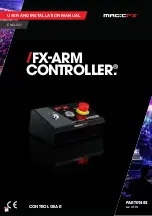
2-8
8. Shut off engine before refueling, and remove fuel cap slowly. Vapor pressure in tank can
cause a burst of fuel and vapor when the cap is removed. Aways refuel with proper fuel
and into proper tank.
9. Know your visibility limitations. Loads being carried on the deck or hanging on the hook
can add further limitations to visibility during travel. Always use a signal person when in
doubt.
INSTRUMENTS AND CONTROLS
The IC-100 instrument panel is equipped with a fuel gauge, an hourmeter, and a bubble
level. Also included are warning lights for low oil and transmission pressure, check engine,
high coolant and transmission temperature, turn signal, high beam, hazard lights, and
parking brake.
The ignition switch is key-operated and has OFF, RUN and START positions. The ignition
switch should always be turned off and the key removed when the vehicle is left unattended.
A horn button is on the shifting control.
The IC-100 is equipped with a standard lighting package. An on-off switch and a high beam
indicator are on the instrument panel. The dimmer switch is located on the left-hand steering
column control. Stop lights are controlled by operating the foot brakes. The turn signal
control is located on the left side of the steering column. Move the lever down for a left turn;
up for a right turn. The emergency flasher lights are actuated by a switch on the instrument
panel.
The hand brake lever is located on the right side of the operator's seat. To apply, lift the
lever until the over-center position is reached. When adjustment is required, turn the knurled
knob on the end of the lever clockwise to tighten. The brake must be released before
adjustment can be made. A warning light shows when the hand brake is applied. The brake
and accelerator pedals are located and operated as they are in other vehicles already
familiar to the operator.
A lever on the steering column controls the powershift transmission. Moving the lever
upward engages the transmission clutch for forward travel. Rotating the handle of the lever
selects the gear that is desired (first through fourth) and engages the clutch for that gear. To
put the transmission in reverse, the machine should be brought to a stop. The lever then is
pulled downward, through the neutral position, into reverse. The transmission and drive train
components can be damaged by shifting from forward to reverse or vice versa while the unit
is in motion, or while the engine speed is above 1000 RPM. A neutral safety switch prevents
starting the engine with the transmission engaged. The shift lever must be in neutral to start
the engine.
Summary of Contents for IC-100-3A
Page 6: ...1 2 IC 100 3A DIMENSIONS...
Page 7: ...1 3 IC 100 A TURNING DIMENSIONS...
Page 18: ......
Page 33: ...2 15...
Page 52: ...3 8 IC 100 LUBRICATION CHART...
Page 57: ...3 13...
Page 58: ...3 14...
Page 68: ......
Page 69: ......















































